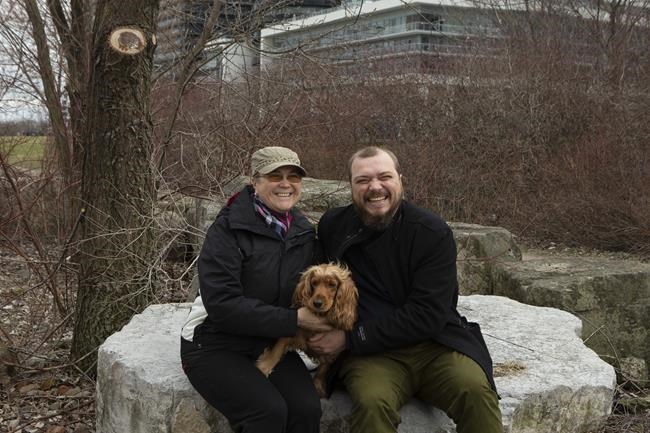TORONTO — Just a few weeks ago Maksym Sliepukhov was taking cover in a Ukrainian forest after Russian missiles hit the army base where he and fellow international volunteers had been training for combat.
It was a world away from his job as a warehouse logistics manager in Toronto – a post he quit so he could travel to Ukraine to both join the fight and help his mother, who lived in Kyiv, flee the country.
Now, after surviving the missile strike and getting his mother to Canada, Sliepukhov sits in a west Toronto restaurant recounting his time in Ukraine.
"Before February 24th, my regular day was like a casual, normal-human-being day. After February 24 ... It was the only one right decision to do," Sliepukhov says of choosing to join the fight in Ukraine.
Sliepukhov was among the foreign volunteers who headed to the country to join the international legion of the Ukrainian army after Russia's invasion began on Feb. 24.
The 36-year-old flew first to Poland in February and then went on to Ukraine with a plan to head to the capital, where his mother lived.
"My main goal from the beginning was to go to Kyiv, because I'm from Kyiv, but when we got to Ukraine the situation was changing so fast," he says.
Sliepukhov, who became a Canadian citizen last year, instead made his way to a training base near Lviv, in western Ukraine. Since he had served in the Ukrainian army for a year before immigrating to Canada in 2014, he says he was made a platoon commander and led a group of 38 international volunteers in training missions.
The base abruptly became the target of Russian missiles last month, he says.
"We were supposed to be in the training for about two to three weeks to build up applicants and train them, assign them to a regiment but the bombing changed that," Sliepukhov says.
"The bombing was so random, nobody knows what to do. I was talking with commanders ... they say 'build up your folks, count them to make sure we have everyone, get ... out to the forest, we will figure it out.'"
The group took cover in the forest, Sliepukhov says, where they also helped support platoons who lost members in the attack. None of Sliepukhov's platoon members died, but a few were injured, he says.
"After the strike, basically our commander, my officers, tell us first of all to count all people, check their mental state," he recalls. "Then we offered them, whoever is not ready to stay ... will be able to leave (Ukraine). We told them, nobody will be judged."
Several members of his platoon decided to leave Ukraine after the Russian attack, he says.
Sliepukhov's mother, meanwhile, made her way from Kyiv to Poland and waited to get a visa that would allow her to go to Canada with her son when he joined her.
"She has a little bit of stress going through the borders and staying in Poland alone while I was in Ukraine, and seeing the country being destroyed," he says.
"She is still in stress but she keeps in touch with everyone she met in Poland who is coming to Canada and with friends who are still in Ukraine."
The federal government launched a special visitor visa program on March 17 that allows those fleeing the war in Ukraine to work and study in Canada for three years while they decide whether or not to return home.
By March 30, 60,000 Ukrainians and their families had applied to come to Canada under that program, and another 12,000 have come under traditional immigration streams since January.
Sliepukhov says he started his mother's visa application even before Canada announced its special program for Ukraine and his girlfriend helped follow up on it while he was on the army base near Lviv.
Kiran Thind, Sliepukhov's girlfriend, noted that a government hotline for the special Ukrainian visa program offers service in English and French but Sliepukhov's mother doesn't speak either language.
As he readjusts to life in Toronto, Sliepukhov says he'd like to keep supporting the Ukrainian war effort by potentially helping to train volunteers in Canada who want to head to Ukraine like he did.
"To do it right, we need to form the groups, interview the (volunteers) to know what exactly what goals they have," he says. "We train people (on) basic survival tactical military skills, like field first aid, like tactical response."
Sliepukhov says he's considering returning to Ukraine to rejoin the international legion as well.
More than four million Ukrainians have fled the country since the Russian invasion began and millions more have been displaced.
This report by The Canadian Press was first published April 10, 2022.
Maan Alhmidi, The Canadian Press



